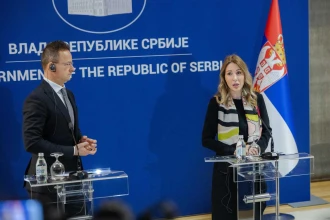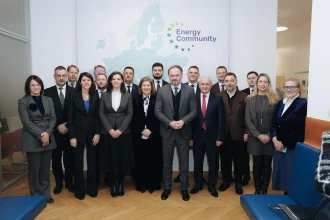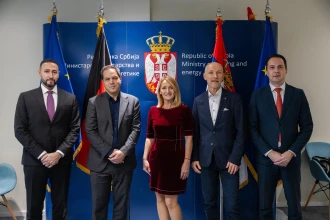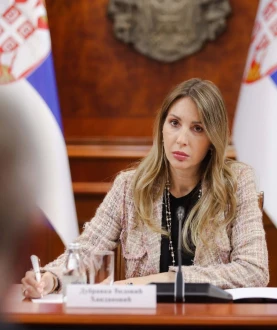Minister of Mining and Energy, Dubravka Djedović Handanović, spoke with representatives of the Chinese company Shanghai Fengling Renewables, which is interested in investing in production and storage capacities for renewable energy sources in the Republic of Serbia, particularly for green hydrogen which represents the future of the global energy industry. Thus, the Republic of Serbia would occupy a significant place in Europe in the production of hydrogen and position itself as an exporter of this energy source in the future.
Djedović Handanović spoke with the representatives of Shanghai Fengling Renewables about the potential investment and construction of a hybrid plant for the production of green hydrogen
"Together with our strategic partners from the Zidjin Mining Group, they are considering the potential construction of a hybrid facility—a solar and wind power plant in the vicinity of Bor. This plant would produce green hydrogen, enabling Zidjin to reduce costs. Investments of around two billion euros are planned for the development and construction of wind power plants, solar farms, energy storage for hydrogen production, and hydrogen fuel energy production technology," she said.
The Minister added that the realization of the potential investment would make use of the wind energy potential in the vicinity of Bor and enhance the efficiency of electricity generation. "The plan is to achieve an energy production of 1,500 megawatts, and the project is expected to reach an output of as much as 2,000 megawatts," she said.
She also emphasised that Zijin would take over the complete production of electricity, while the surpluses would be converted into hydrogen. "In addition to meeting the electricity demand in the mine, renewable energy would be utilized for the production of hydrogen, thus allowing green energy to be stored with a production capacity of 30,000 tons per year." Also, investments of 10 million euros are planned for the construction of an industrial park for the production of wind towers," said the Minister.
Djedović Handanović highlighted that Serbia is in the process of energy transition and stressed the importance of companies applying the most advanced technologies in this field.
"Serbia is currently undergoing an energy transition, aiming to achieve a 45 percent share of renewable energy sources (RES) in electricity production by 2030, fully utilizing its natural potential." We need companies that develop and apply the most advanced technologies and possess knowledge in order to enable us to keep pace with the world in the transformation and decarbonisation of the energy sector," said the Minister.
She further highlighted that the Member States of the European Union are planning substantial investments in the production, storage and transport of hydrogen—the energy source of the future, which is intended to replace fossil fuels. The Minister pointed out that the demand for hydrogen in developed European countries will significantly increase due to their plans for hydrogen infrastructure. "Many developed European countries are planning a substantial import of hydrogen, primarily for industrial processes. Therefore, the Republic of Serbia could potentially become a significant exporter of hydrogen to those countries with the implementation of this project," said Djedović Handanović.
Representatives of Shanghai Fengling Renewables presented innovative projects that they are developing in China and globally, along with proposals for establishing cooperation with institutions and companies in the Republic of Serbia in the field of electricity and thermal energy production from RES, energy storage and the application of hydrogen - whose global demand is expected to grow intensively in the coming years and decades.
Shanghai Fengling Renewables has already registered a company in Serbia and is commencing recruitment to work on the development and realization of this project.


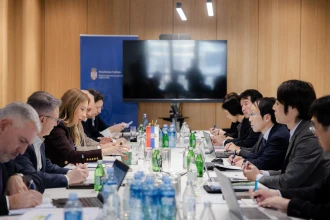
.webp)
